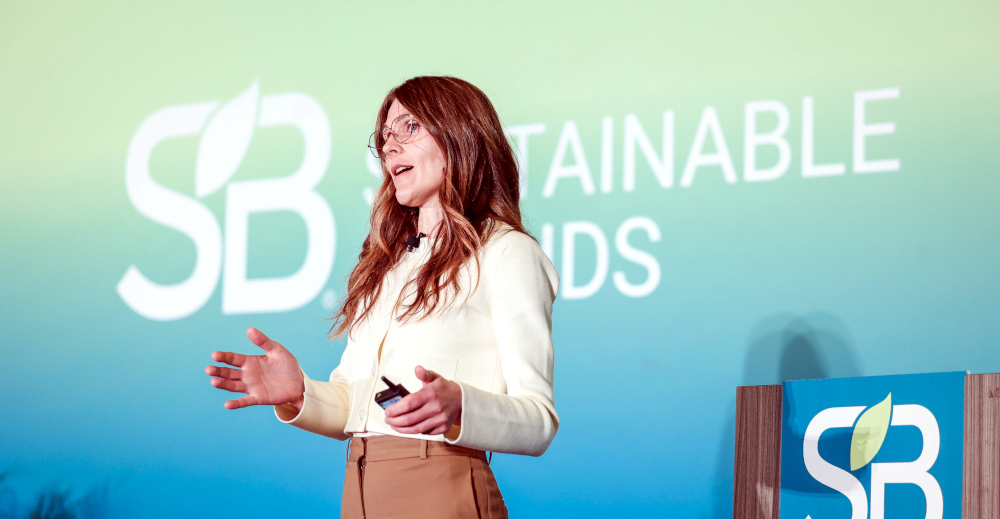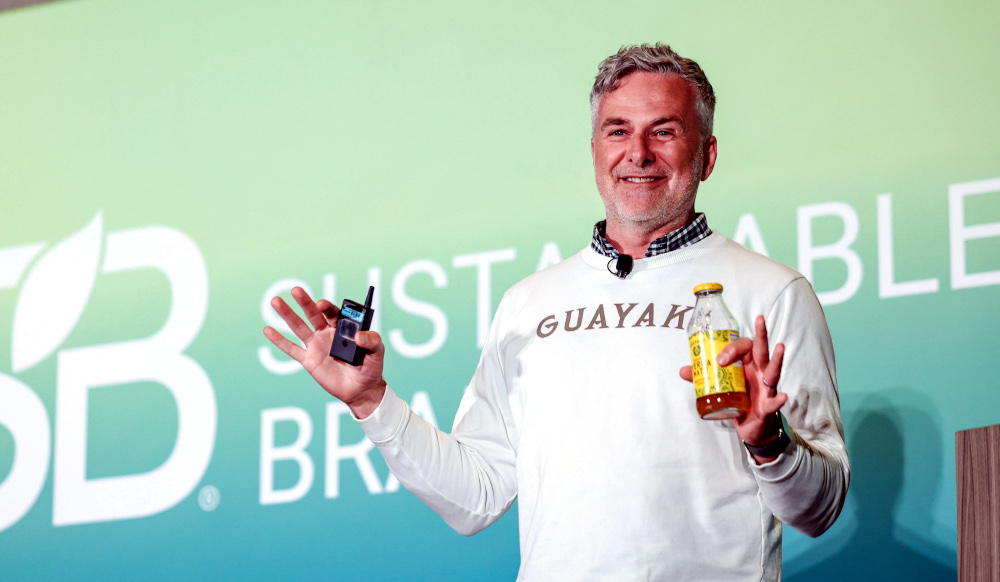The rise of complementary proteins diversifying food production
 Image credit: Plantible Foods
Image credit: Plantible Foods
Addressing the environmental and social impacts of industrial agriculture has
become crucial as global meat consumption continues to rise. Industrial animal
agriculture emits more greenhouse gases than the entire transportation sector
combined and contributes to climate change, biodiversity loss and food
insecurity.
A Tuesday afternoon panel, moderated by Marika
Azoff — Corporate Engagement Lead at
the Good Food Institute — convened innovators from cultivated,
fermentation-derived and plant-based protein startups creating sustainable
solutions to meet growing protein demand without further harming the
environment.
There are currently over 1,500 companies working on complementary proteins and
products, seeking to create more protein options for consumers. One of these is
San Diego-based Plantible Foods, whose
contribution to reshaping agriculture comes from lemna (aka
duckweed)
— a tiny, high-protein, aquatic plant that contains all 9 essential amino acids,
doubles in size every 40 hours, requires minimal resources (10x less water than
soybeans [almost 100x less than beef] and uses zero arable land, according to
Plantible’s website), and absorbs 10x more CO2 than a healthy forest. The
company extracts lemna’s protein to produce Rubi
Protein™ — which the company says
also emits significantly less greenhouse gas than conventional, animal-based
protein sources.
“Rubi can be used in a wide range of applications — in the plant and meat space,
as well as the cosmetics space,” said Plantible co-founder Tony
Martens.
Meanwhile, Sacramento’s The Better Meat Co
champions mycelium protein as a sustainable alternative to animal protein.
Unlike traditional meat production — which is lengthy, resource intensive and
polluting — mycelium can be grown and harvested in just 20 hours, making it
highly efficient. As Principal Plant Engineer Jacqueline
Samson explained,
mycelium-based
proteins
offer a whole-food approach — preserving valuable nutrients and producing less
waste without the need for complex protein-isolation processes.
“Our ingredients go into any kind of packaged goods that you can find at the
grocery store,” she said. “It’s also an ingredient that can be hybridized with
meat
products
due to the fact that it has neutral flavor and color, and a meat-like texture.”
While these innovations show promise, scaling these technologies is critical. If
alternative proteins are not affordable and scalable (as well as delicious),
their positive impact on sustainability will remain limited. Israel’s Aleph
Farms is on a mission to replace the whole
cow
through cellular
agriculture,
which lab-grows meat directly from animal cells. In addition to freeing up
considerable land and water resources, cultivated beef production eliminates
methane
emissions
— a major benefit over conventional beef farming.
“We want to appeal to the most people as possible,” said Nicky
Quinn, Aleph’s VP of Marketing. “We
want to have delicious products that people want to eat.”
The journey to mainstream adoption of these novel
proteins
involves engaging both businesses and consumers. Plantible Foods’ and The Better
Meat Co’s offerings are primarily focused on B2B markets — providing ingredients
for plant-based and hybrid meat products, as well as non-food products. These
partnerships are essential to introducing novel proteins into familiar products,
making the transition smoother for consumers. Educating the
public
on the environmental and health benefits of alternative proteins is also crucial
to achieving widespread acceptance.
“I call it aesthetic activism,” Quinn said. “Trying to make the right things
cool and delicious through the power of storytelling and experiences to
persuade people to make better
decisions.”
As the alternative protein industry advances, securing capital and expanding
production capabilities are key milestones. The need for investment, strategic
partnerships and government support to build commercial-scale facilities and
drive innovation will be key in cultivating the widespread shifts in eating
habits necessary to help future-proof our food system.
The theme of food-system change, with an emphasis on regenerative agriculture,
carried through several keynotes on the final day.
Unlocking consumer demand for regenerative agriculture
 Kristine Root
Kristine Root
Kristine Root, Chief Marketing
Officer at regenerative ag certifier Regenified,
examined the field from a consumer demand perspective. She shared the findings
of a Regenified study that assessed consumer interest in regenerative
agriculture and values-based purchasing — which found that while only 12 percent
of the US population doesn't care about deeper values when making purchases, 88
percent are driven by more than taste, price and brand. A subset of these
values-based shoppers aligns with the principles of regenerative
agriculture
— with 68 percent of general consumers, 86 percent of value-based shoppers, and
94 percent of regenerative shoppers supporting regenerative products. Awareness
of regenerative
agriculture
has grown rapidly, doubling in the past 12 months due to things including
documentaries and media coverage. Regenified’s research suggests that
‘regenerative consumers’ are not to be underestimated — they represent 20
percent of the population and are highly motivated; 89 percent will go out of
their way to purchase regeneratively grown products and 92 percent want
certification. “The regenerative shoppers are more engaged, more educated, and
more motivated to take action,” Root asserted. “These are the people marketers
should want to mobilize.”
However, 40 percent of value-based and 44 percent of regen shoppers say they
struggle to find these products. Addressing this barrier by highlighting
regenerative-ag practices as a
differentiator
will not only drive brand reputation and revenues but foster a more resilient
food
system.
Check out more highlights from throughout the week at SB’24 San Diego!
How to reframe your brand as a lifestyle choice while remaining true to your mission and values
 Ben Mand
Ben Mand
Ben Mand, CEO of Guayakí Yerba
Mate, shared additional insights on making a brand more successful
by aligning purpose with product. Yerba Mate, a caffeinated plant enjoyed
for centuries in South America, serves as the core of Guayakí’s
mission-driven business — which started in 1996. Mand argued that while style is
easy to sell, lasting brand success comes from having a clear purpose that
resonates with consumers. He believes brands, like people, need to be
multidimensional — balancing sustainability with authenticity. Guayakí’s recipe
for success can be applied to any brand trying to show up as a lifestyle brand:
fostering genuine connections with communities, resisting trends that compromise
the brand’s values, and staying true to its purpose of improving the
environment.
“Establish your foundation and authenticity before you focus on style,” Mand
advised. “You can be funny or whatever you want, as long as it is true to you as
a brand.”
The Walmart + PepsiCo model for championing regenerative agriculture
 Mikel Hancock and Margaret Henry
Mikel Hancock and Margaret Henry
Next, Margaret Henry, VP
of Sustainable and Regenerative Agriculture at
PepsiCo; Dan
Yeoman, Managing Director of the
Soil and Water Outcomes Fund; and Mikel
Hancock, Senior Director
of Sustainable Food and Agriculture for Walmart,
shared lessons learned from the two food giants’ ongoing collaboration to scale
regenerative
agriculture
across their shared North American supply chains. The three partners emphasized
the importance of collaboration between companies, farmers and external
stakeholders — exemplified in their Midwest Row Crop
Collaborative. Lessons learned to date include:
Scaling efforts and creating a resilient supply chain hinge on aligning internal
business goals with sustainable farming practices; farmers need support through
risk reduction and long-term investment; and external partners, including
governments and NGOs, are key to meaningful impacts. A key challenge is making
regenerative practices relevant and accessible to farmers and consumers while
ensuring future progress through collaboration and shared vision.
“You have to have humble conversations with everyone in the room,” Hancock said.
“If you stop, listen, provide assistance and find a shared goal; you can get
momentum really fast.”
Preserving rice for generations to come
 L-R: Kristen Campos and Hallie Shoffner
L-R: Kristen Campos and Hallie Shoffner
Collaboration with farmers is also central to Mars’
partnership with rice producer Delta Harvest.
Kristen Campos, VP of
Corporate Affairs at Mars, and Delta Harvest Farmer-CEO Hallie
Shoffner discussed how their
collaboration has led to research and learnings advancing water conservation in
US rice farming. Mars, producer of Ben's
Original — one of the world's most popular
rice brands — partnered with Shoffner and her team of other women and minority
farmers to explore ways to cut water use and greenhouse gas emissions from
producing rice, a crop that feeds 4 billion people globally but consumes large
amounts of water and contributes to 1.5 percent of global GHG emissions.
Together, they are working with the USDA to scale practices including
alternate wetting and
drying
and multiple inlet
irrigation
to cut water use and methane emissions, and promote financial incentives and
collaboration to make these practices profitable and scalable for farmers.
“It’s not simple; every farm is different, and every practice has pros and
cons,” Shoffner said. “We need an economic system that funds research and
incentivizes on-farm implementation.”
Get the latest insights, trends, and innovations to help position yourself at the forefront of sustainable business leadership—delivered straight to your inbox.
Impact Manager, Purpose + Sustainability
Formerly working in the advertising world in Kansas City, Hannah Zimmerman has now married her past experience with her passion for sustainability. When she isn't chasing her four-year-old daughter or helping companies along on their sustainability journey through consulting, reporting, communications and certifications, she is working on her master's in Sustainability through Harvard.
Published Oct 23, 2024 2pm EDT / 11am PDT / 7pm BST / 8pm CEST